"Lonely Petri Dish": Finding Your Own Voice
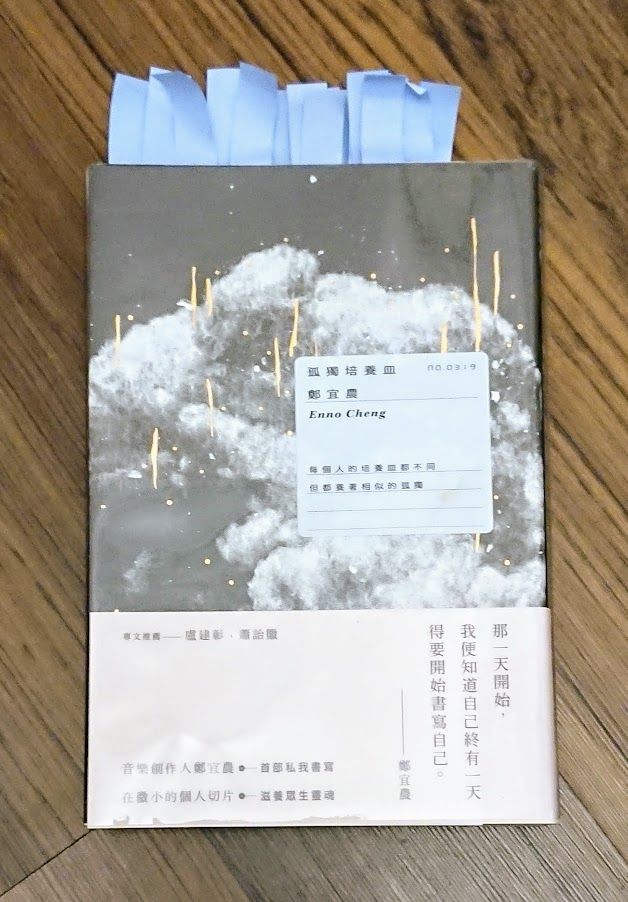
A few days ago, when I visited the bookstore in Taiwan Aluminum , I saw Zheng Yinong's book "Lonely Petri Dish". I remembered that she had previewed this book during her Jingzhisheng tour last year. I thought it was fate, so I bought it.
"Lonely Petri Dish" is Zheng Yinong's second collection of essays, including 25 of her essays. The introduction at the bottom of the book is beautiful:
Use tweezers to place a sound,
one sentence,
a taste or a touch,
Cut out the story of a certain life and make it into a slide,
Look carefully under the microscope of memory...
Actually, it's been a while since I read this book. I like it, but I don't know how to write my experience, so I dragged it. I turned it over again recently, and the feeling is still a little vague, but let's write it down. Secretly predict that there will be Easter eggs at the end of the article.
[Loneliness: longing for connection? 】
From the title of the book, the concept of loneliness can be seen everywhere in the book. Zheng Yinong is the only child, and she lived in the mountains when she was a child. To some extent, it can be said that she was born with a built-in loneliness gene.
Maybe lonely people are easily attracted by similar figures, so she in <Cactus> saw that lonely and rampant existence, and went straight to hug without turning back. As a result, although it was full of thorns and puzzled by others, it was romantic that only you understood my mood.
I also like the slightly suspenseful feeling of loneliness in "The Story of the Voice". Watching her set off from a childlike adventure, cross the dark corridor to the next room, and use the sound of knocking on the wall to connect with the invisible opposite. "Knock, knock, knock", "knock, knock, knock", two worlds that are invisible to each other will eventually intersect. But the sudden break of everything, the loneliness mixed with the ghostly atmosphere, made even me nervous. I couldn't help laughing when I saw the last Bianshi Wan soup. I love that sentence:
My favorite is dry noodles and flat food ball soup.
Recently, I read the article " The Nineteenth Century: The Birth of Loneliness", saying that loneliness is actually a concept that only appeared in the nineteenth century. The loneliness in the past simply represented the state of being alone, but the loneliness now obviously represents more of an independent mentality. You can be in a crowd and still feel lonely because you can't connect with others.
Zheng Yinong said BOOK in Ni, I said that the description of loneliness in the interview is very interesting, she said: "Loneliness is a bit like being accidentally drawn on your hand, feeling itchy, but you can't tell others that you are injured, nor will you Wanted to bandage it. So I ignored it and accumulated a lot of itching. It wasn't until one day I realized that these feelings were hurt."
The book mentions that she was always comfortable building her voice, perhaps because she was a child growing up in silence, so she desperately needed to be heard.
In a way, is loneliness actually due to the desire for connection?
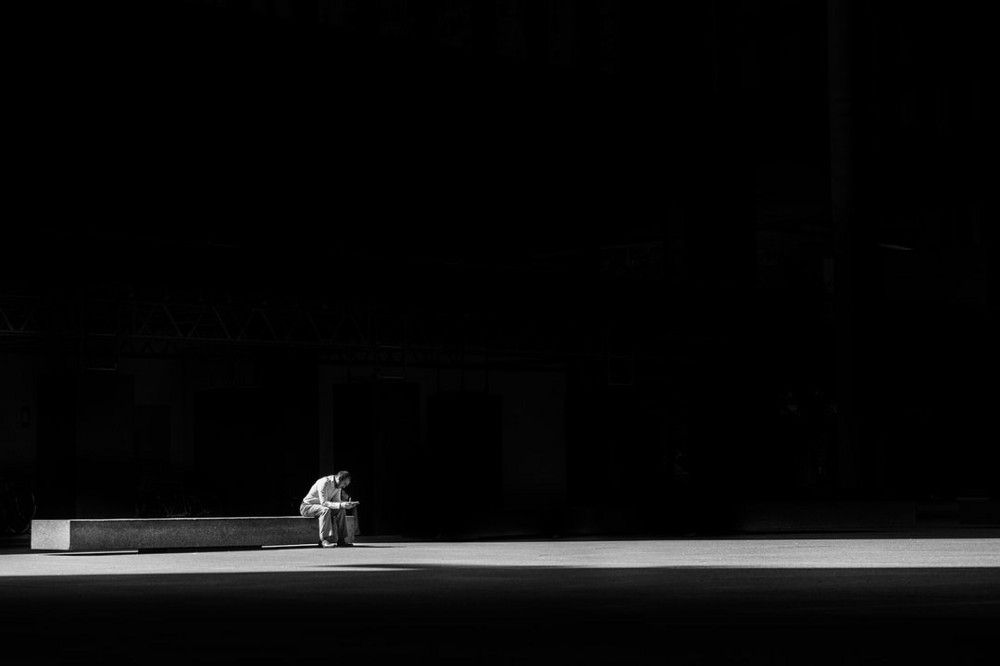
[Position: Right? 】
Another theme in the book that got me thinking was the pull on position. If you want to connect with the world because of loneliness, where do you need to go and how do you act? If one does not handle it well, it may be scarred instead.
When it comes to Zheng Yinong, many people may still think of her vigorous performance with the lead singer of Fire Extinguisher. "In Past and Present Lives" examines these pasts in great detail. Of course, the face of things is often extremely complicated. Perhaps we can talk about it from the perspective of "what a woman should be like".
Zheng Yinong questioned the marriage system in the book, I think it is quite emotional. Why is it necessary to splash water when marrying a daughter, how can this bond be broken? Or, why can't the woman go home to see her family on New Year's Eve, and must stay at her husband's house to take care of people who are not related to her?
Recently, I happened to chat with my colleagues about the unfairness of the Chinese New Year to girls. I said, "Then don't celebrate the New Year." She said, "Yes, it's better to go abroad every year for the New Year! Ah, but I don't have the money..." Well, the sadness of the loose eaters .
Pull away and return to Zheng Yinong. Since there is such a disagreement, how can it enter into marriage? In the book, she mentioned that when she was engaged in a marriage contract, facing her husband and his friends, she could be said to be in a state of full motherhood.
On the occasions when the boys enjoyed the wine, let go of their external hardships and grievances, and drank to the point of trash talking and rolled on the ground, they were called by their sister-in-law to pour wine and serve dishes for everyone. The ones who laughed and listened more emotionally fell into their own circles.
Although she seemed to be cosplaying when she complained, she was satisfied at that time. When she decided to marry, she believed that the ultimate state of a relationship must be tied to the world. Through this ritual, become a part of the world and affirm your own integrity.
If I hadn't been in that marriage, I wouldn't know how much I longed for that wholeness, how much I longed to be a stamped person.
In this way, it seems that the union of the two does not only belong to the two, but also has the function of helping each other to fit into the expectations of society. Everyone may know the story after that, at least at the time, it caused a lot of ripples on the news page.
It’s just that I gradually realized that, at least for me, the so-called sexual orientation is not just a physical intuition, and the psychological part accounts for a larger proportion.
I think that people want to be connected to the world because of loneliness, but if they can't find the right position, they can't act the way the world expects, and they will be more lonely, right?

[Balance: Collision and Reconciliation? 】
Talking about loneliness and groping about location, perhaps how to touch and connect with the world is a theme that is bound to be encountered as a human being. So finally, I want to talk about the balance part.
I really liked the paragraph in "Pinball Superman" where Zheng Yinong found his favorite toy "The Devil of the Wind" and was about to pay for it. The standard version of its own desire and the pull of world cognition.
Everyone thinks that girls should like pink, paper dolls and pocket Barbies. TV commercials in toy stores and other mothers of children say the same, but I chose the most boyish one. Everyone must be talking about it. A look of incomprehension and blame.
As mentioned in "Mirror", when walking on the road, people turn their heads to look at the car window unconsciously, people seem to be always used to checking whether they are in line with the world's expectations.
We look for answers in reflection, and we are satisfied.
Thinking of myself in a similar situation. When people ask me about my leisure hobbies, my standard answer is "playing basketball". Of course this is true, but paradoxically, I rarely answer "reading books". Perhaps the people around me have few reading habits, and subconsciously feel that they like to be out of the group and habitually don’t talk about it. But after I started writing about my reading experience, I seem to be more comfortable saying that I like reading.
Just like in the end she still bought Pinball Superman; I don't look back at the car window when I walk, so I've grown too, right?
Even if you are treated as a strange creature and you are enveloped by a huge sense of loneliness, you still have to move forward with your own attitude. This is the way of survival of our clan.
In the interview with Jiang Yani, Zheng Yinong mentioned that he wants to collide with the world and create a trajectory, a trajectory that he is comfortable with but can connect with the world.
She can be said to be doing this by herself, such as the algae reef text a while ago is a good example. However, she also admits that such a collision is not so clear and certain. A lot of times, after all, you can only sway around.
To a certain extent, I am also trying to collide with the world when I write articles and get fans. But until now, I still don’t know what kind of voice is called “my own” voice; I’m still groping about what kind of voice can make me feel comfortable and resonate with the world. When the impact was silent, it was still somewhat sad (laughs). Anyway, keep trying.
Swinging hard all the time, it will eventually move forward.

【Postscript: Find your own voice with writing】
Talking about things seems to be relatively heavy, but I want to emphasize that this prose does not smell like this. When I read this book, when I saw the clip of his father telling her to eat soil, I suddenly thought that Zheng Yinong's writing might be like soil. As Jiang Yani said, she uses a "light" way to talk about these heavy things.
Perhaps as Zheng Yinong said in the interview, she deliberately left space in the text so that readers can project themselves into it. As written on the back of the book:
The moment everyone's petri dish is opened,
The solitary mycelium floats along the airflow and meets in the air.
Sharing the loneliness may not be so lonely.
Okay, when it comes to the promised Easter egg time, in fact, Zheng Yinong and I are also related (talk about it myself). The first time I saw her was when I was a sophomore in high school. At that time her father took her to our school to promote "The Tail of Summer" . At the end of the event, she played and sang a song. The vocals are accompanied by guitar, pure and clean. In the small audio-visual classroom, it gave me a great shock.
At that time, my friend and I had an appointment to watch this movie, but unfortunately, the schoolwork was heavy at that time, and I suddenly looked up from the book and recalled it, and the movie was already down. But I still have the soundtrack and movie tickets I bought at the event.
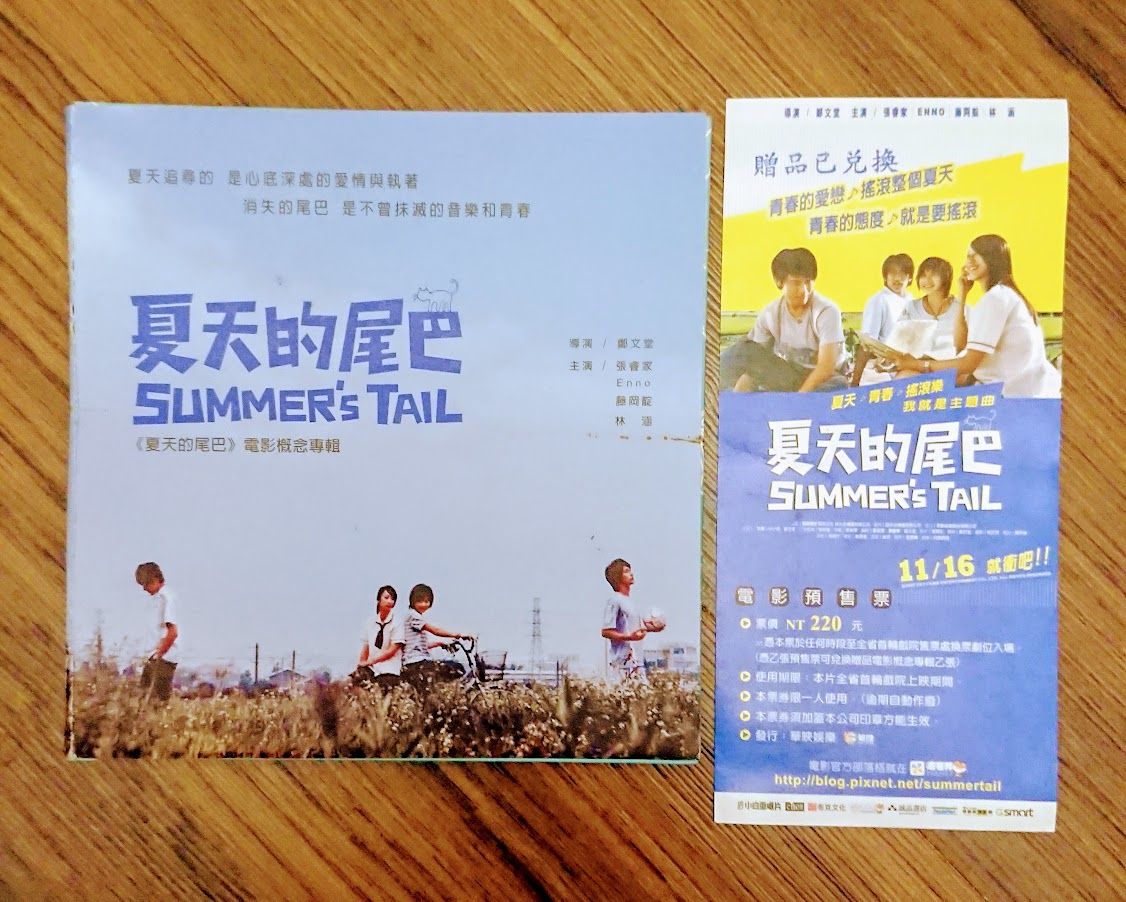
Last year, I went to her Well Sound tour with my high school friends. After watching the show, I am still moved. My friend and I couldn't help but sighed jokingly: Ten years ago, we were offstage and she was on stage; ten years later, we were still offstage and she was still on stage, but the stage was so high and so far away...
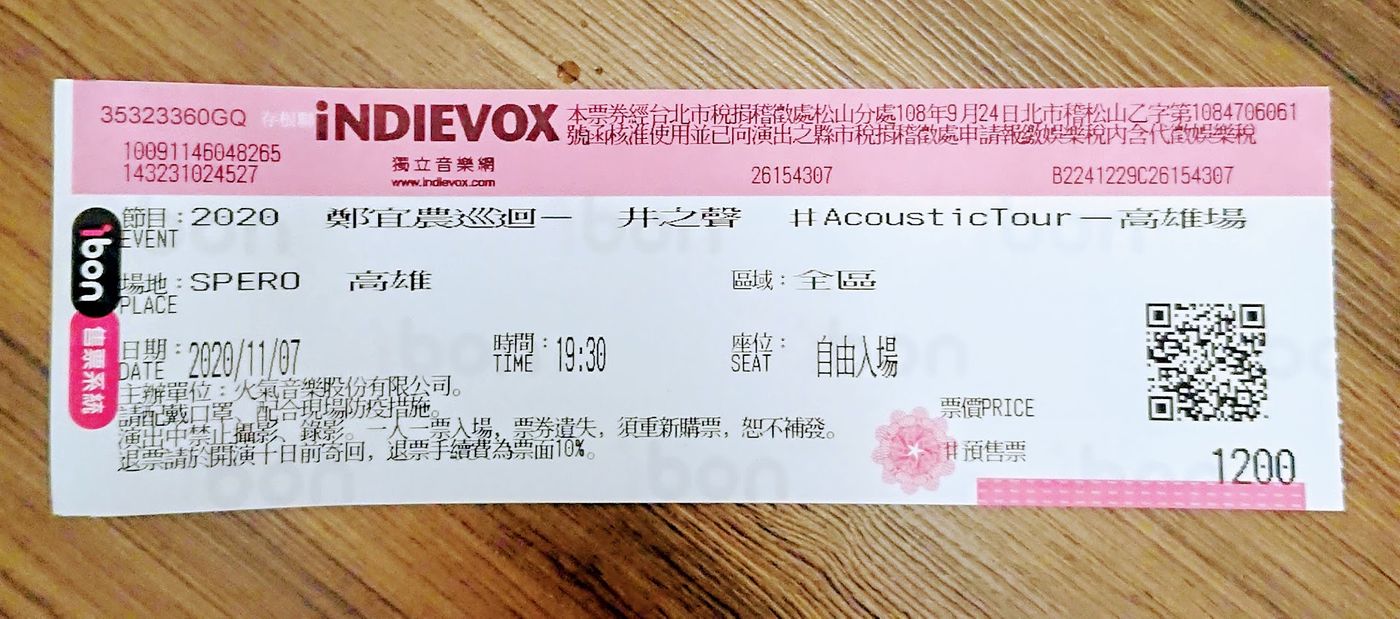
Suddenly I feel a little sad, but the ending is still positive!
I really like Zheng Yinong's approach in this essay. Through writing, he picks up fragments of life and puts them on glass slides for memory inspection. As she said:
Looking back at each stage, there are a few more keys in those blank spaces that we haven’t seen before. The so-called growth is actually looking for answers in these missed regrets.
In the interview (?) of the illegal girl Lalaland , Zheng Yinong mentioned that she deliberately created a distance to write about herself, which has a taste of three-person viewing. Suddenly it seemed worth trying to rediagnose myself with writing. Of course, when I write my experience here, I also incorporate some of myself into the text, but it is still relatively indirect. Maybe I can try to write something more directly inward, not necessarily.
By the way, when I heard Zheng Yinong say that writing this book is to create a space, I was surprised to find that this is not the same as the purpose of naming my blog. It was originally named "Music's Reading Space " in the hope that this is not just a corner of my whispers, but a platform where everyone can come in and participate in interaction, although this goal is still a little far away.
Even if he is old enough, he still seems to be still trying to figure out what he wants to be and how he wants to connect with the world. Maybe it's a good step to write something here? Use writing to stretch your tentacles and find connections with others.
I hope that one day I can live out the condensed chain mentioned in "16 of 3 beats"!
Articles you may also be interested in:
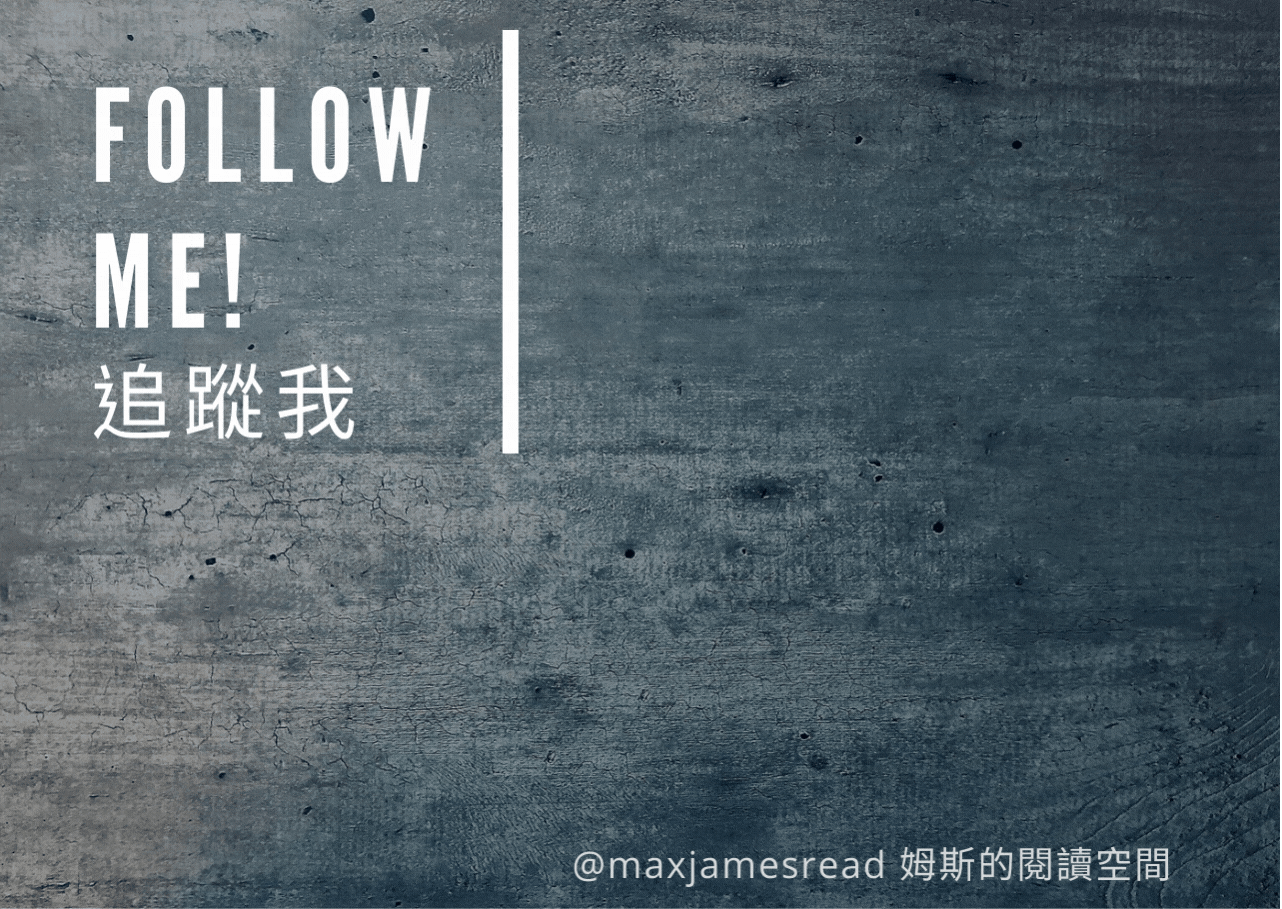
↓↓You are also welcome to follow the Facebook and mourning of "Mrs's Reading Space"↓↓
James' reading space FB
James' reading space IG
Like my work? Don't forget to support and clap, let me know that you are with me on the road of creation. Keep this enthusiasm together!


- Author
- More